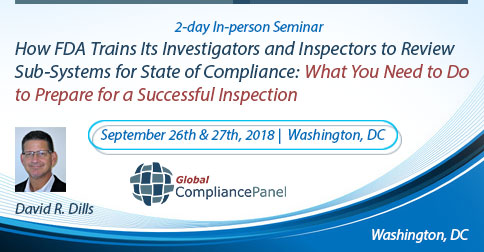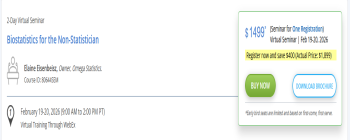
Course "How FDA Trains Its Investigators and Inspectors to Review Sub-Systems for State of Compliance: What You Need to Do to Prepare for a Successful Inspection" has been pre-approved by RAPS as eligible for up to 12 credits towards a participant's RAC recertification upon full completion.
Description:
Senior management takes responsibility for Quality and GXP compliance. It is not something delegated to the Quality unit or to the Regulatory Affairs group. Developing and implementing an effective Inspection readiness plan will help ensure better results, as well as a less stressful inspection. Planning strategically ahead will reduce document turn-around time, improve presentation skills from SMEs, and increase inspector confidence in the Quality System. Successfully completing an FDA inspection is critical to cGMP operations and commercial success. Implementing and maintaining robust quality systems is one element to accomplishing this goal. However, it is not the only element. Inspection preparation and management is another, equally important element to ensure a successful outcome. In fact, proper Inspection Management techniques can help mitigate the risk of receiving an observation for compliance gaps. Quality and GXP compliance are an opportunity, not an obligation, and are owned by everyone in the organization. For those interacting with FDA regarding submissions, as an example, every interaction with the FDA is a crucial moment for your development program, and meetings represent a culmination of compiled and scheduled work. Strategies, timelines, costs and complexity are all organized through this interaction - the stakes are high, and the outcomes are extremely important. It all comes down to strategic communication. Every facet of FDA meetings - from the information your company is providing, to scientific research and the tone and articulation of that information - must be conducted flawlessly. For example, for many medical device companies, a meeting with a US Food and Drug Administration (FDA) Advisory Committee is a high-profile, high-stress event. A successful meeting can assure regulators, patients and investors that a product is safe and effective, while an unsuccessful meeting can torpedo a product's chances of a timely approval.
Why you should attend:
This seminar will offer learning on the following:
- How a firm should prepare for an FDA inspection
- Ways to train employees in view of the inspection
- Field Management Directives
- Sub-Systems for Pharmaceutical and Medical Devices
- The emphasis on systems-based inspections...and the IOM, QSIT, CPGM and other crucial FDA reference documents
- How to ensure that required documentation is in place
- How to interact with the investigator-DO's and DON'T's
- What companies should do when the inspection ends
- Post inspection actions
- Why inspections are conducted and by what statutory authority
- The emphasis on systems-based inspections...and the IOM and other crucial FDA reference documents
- Define and execute proven GxP Compliance Strategies
- Proven Operational Readiness and State of Readiness tactics
- Determine optimal pathway during inspections and post-inspection correspondence and meetings
- Identify the visible signs of GXP compliance that are present as a daily reminder of the importance of GXP compliance with "risk-based" awareness demonstrated by companies
- Improve credibility and trust with FDA and other regulators
- Important training areas in GxP compliance and topical issues
- Gain a better understanding of how to interact and communicate effectively with FDA
- Identify the ground rules and do's and don'ts with FDA inspections
- Learn what FDA can request and not request during an inspection
- Understanding the interview process and why pre-inspection planning is critical for your company
- Navigate the inspection process from preparation, execution to close-out and debrief/exist interview
- FDA authority and process including 483s, Warning Letters, recalls, and other potential actions
- The FDA inspection process and approach
- The use of a mock audit and outside certifying audit
- Required documentation, format, and archive
- How to respond to inspection and audit results
- In a group setting, review and discuss pain points, challenges and workable regulatory and compliance solutions for any FDA inspection
- Prepare for lively discussions and a mock inspection as part of a classroom exercise
- Communicate effectively with FDA and reference FDA guidance and other critical resources.
Who will benefit:
This seminar will provide an overview and in-depth snapshot of the entire process for preparing for and managing an FDA inspection and external regulatory inspections and for those companies which must establish proven and sustainable GXP compliance strategies and risk mitigation strategies when responding to a crisis. Employees who will benefit include all levels of management and departmental representatives from key functional areas and those who desire a better understanding or a "refresh" overview of the FDA inspection process from preparing for the inspections, during the inspections and post-inspection responsibilities and follow up activities with FDA, including:
- Executive Management
- Regulatory Affairs Management
- Regulatory Affairs Specialist
- Auditors
- QC/QC Management
- Compliance Officer
- Compliance Specialist
- Clinical Affairs
- Quality Assurance Management
- Marketing & Sales
- Laboratory Operations
- Distributors/Authorized Representatives
- Legal Counsel
- Engineering/Technical Services
- Operations/Manufacturing
- Consultants
- Individuals who come in contact with regulatory inspectors
- Auditors
- Compliance/Regulatory affairs professionals
- QA/QC professionals
- Manufacturing managers, supervisors & personnel
- Project Managers
- Regulatory Affairs Management
- Regulatory Affairs Specialist
- Compliance Officer
- Compliance Specialist
- Clinical Affairs
- Distributors
- Legal Counsel
Agenda:
Day 1 Schedule
Lecture 1: Introductions and Background
Lecture 2: FDA's Inspectional Authority and History
Lecture 3: FDA Inspection Program Overview
Lecture 4: Key factors for a successful FDA inspection
Lecture 5: Quality System Readiness
Lecture 6: Organization Readiness
Lecture 7: Manage Inspection Outcomes
Lecture 8: Information and Documentation
Lecture 9: How should a firm prepare for an FDA inspection?
Lecture 10: Ways to train employees in view of the inspection
Lecture 11: How to ensure that required documentation is in place
Lecture 12: How to interact with the investigator-DO's and DON'T's
Lecture 13: What companies should do when the inspection ends
Lecture 14: How to reply to 483's and Warning Letters
Lecture 15: Legal implications of non-compliance
Lecture 16: Why inspections are conducted and by what statutory authority
Lecture 17: The emphasis on systems-based inspections...and the IOM and other crucial FDA reference documents such as QSIT
Lecture 18: What is subject to FDA purview and what's off-limits
Lecture 19: Understand and apply the do's and don'ts and comprehend that preparation is the key to success
Lecture 20: What are the prohibited "Acts" and the enforcement categories that you need to deal with?
Lecture 21: What you need to know and do to prepare for, during and even after the inspection...and why your inspection response team is key
Lecture 22: The company's Inspection Plan (SOP) can make or break the inspection depending on how to use it and training your personnel
Lecture 23: How to respond to findings and facilitating the documentation and remediation process...and reaching final closure
Lecture 24: Define clear responsibilities, roles and goals for personnel involved in FDA inspections and SOP development
Lecture 25: Exit Interview
Lecture 26: FDA interviewing employees and personnel
Lecture 27: Management Controls, Production and Process Controls, Design Controls, CAPA, and sub-systems
Day 2 Schedule
Lecture 1: Quality System, Facilities and Equipment System, Materials System, Production System, Laboratory Controls and Operations, Packaging and Labeling System
Lecture 2: Maintain, or return to, regulatory compliance and minimize downtime
Lecture 3: Establish a risk management plan in place to proactively manage compliance, including a crisis-management plan
Lecture 4: Set post-inspection deadlines and working closely with FDA's regulatory partners
Lecture 5: Compliance remediation is the process of recognizing problems, creating a plan to correct and prevent them from occurring in the future, and executing to that plan to helps with your GxP Compliance Strategy.
Lecture 6: Guidance outlining clear recommendations for sponsors and for FDA staff and managers as well for Pre-Submission meetings as expected timeframes for scheduling meetings
Lecture 7: Mechanics of requesting any FDA meeting and what you need to know to be successful with communication style, approach and tactics
Lecture 8: Prioritize follow-up on warning letters and other enforcement actions
Lecture 9: Develop and implement a formal warning letter "close-out" process
Lecture 10: Untitled Letter and the Warning Letters
Lecture 11: Recent Trends and Enforcement Actions
Lecture 12: Mock Inspections and Mock Audits and why role playing is important
Recap of Day 1 and Day 2
Exercise on Day 2
- Interactive Discussions
- Review Regulatory and Compliance Documentation
- Recent Enforcement Actions and Emerging FDA Trends
- Classroom Project: Prepare for and Host an FDA Mock Inspection and Prepare Effective Company Response to FDA 483 and/or Warning Letter
Speaker:
David R. Dills
Global Regulatory Affairs & Compliance Consultant and President, NovaQual
David R. Dills, Global Regulatory Affairs & Compliance Consultant, Interim President, currently provides global regulatory affairs, compliance and quality consultative services for early-stage and established Class I/II/III medical device, including combination products, In Vitro Diagnostics, nutraceuticals/supplements, cosmetics and biopharmaceutical manufacturers in multiple medical specialties and therapeutic areas on the global landscape, and has an accomplished record with more than 26 years of experience in the areas of Regulatory Affairs, Compliance and Quality Systems. He has been previously employed, with increasing responsibilities, by medical device manufacturers and consultancies, including a globally recognized CRO, and has worked directly with manufacturers engaged in compliance remediation activities and services involving consent decrees, CIA's, warning letters,483 observations, and customer generated compliance events. He prepares for and conducts QS and regulatory audits He is currently acting and interim President at NovaQual LLC.
Location: Washington, DC Date: September 26th & 27th, 2018 and Time: 9:00 AM to 5:00 PM
Venue: Courtyard Arlington Crystal City/Reagan National Airport 2899 Jefferson Davis Hwy, Arlington, VA 22202, USA
Price:
Price: $1,495.00 (Seminar Fee for One Delegate)
Register for 5 attendees Price: $4,485.00 $7,475.00 You Save: $2,990.00 (40%)*
Register for 10 attendees Price: $8,222.00 $14,950.00 You Save: $6,728.00 (45%)*
Sponsorship Program benefits for seminar
For More Information- https://www.globalcompliancepanel.com/control/sponsorship
Contact us today!
NetZealous LLC DBA GlobalCompliancePanel
john.robinson@globalcompliancepanel.com
Toll free: +1-800-447-9407
Phone: +1-510-584-9661
Website: http://www.globalcompliancepanel.com
Registration Link - https://www.globalcompliancepanel.com/control/globalseminars/~product_id=901747SEMINAR?seo
Follow us on LinkedIn: https://www.linkedin.com/company/globalcompliancepanel/
Like us our Facebook page: https://www.facebook.com/TrainingsAtGlobalCompliancePanel/
Follow us on Twitter: https://twitter.com/GCPanel








